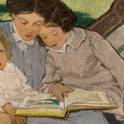You are walking down the street, in a bit of a hurry, thinking about your tax return or the next meeting, and a pollster stops you in the street to ask your opinion about Ed Miliband, Scottish independence and exiting the European Union. You give three quick answers and hurry on. Was each answer a snap judgement, made in the instant? Of course not. Even if you had not spent much time consciously pondering these matters and discussing them in the pub, you had subconsciously been processing news, opinions and impressions repeatedly encountered. Dispositions had been forming.
Of course, competing dispositions might have been forming—this is what we mean by being undecided. We are in effect waiting on ourselves to see which side of the argument will prevail when choosing becomes necessary.
Being asked a question can prompt that choice, as with the collapse of the wave function when an observation is made of a quantum state, causing something indeterminate to become determinate. Or it might not: but then you are really unsure, and no judgement is forthcoming. Your response to the pollster goes into the “don’t know” column.
“Disposition” is a philosophical term of art in this context. A dispositional attitude is contrasted to an occurrent one—the latter being an attitude consciously possessed at a given moment, while the former is latent until called forth by (for example) being asked to make a judgement. We each have an enormous fund of dispositions, consisting of beliefs and tendencies to react in distinctive ways, almost all of them formed by experience and most of them unconsciously. (“Almost all” because there might be genetic dispositions to react to certain stimuli in certain ways. Mammals appear to be genetically programmed to notice and shy away from spiders and snakes, for example.)
We talk of “intuitions,” “gut feelings” and “snap judgements” as if these were exemplars of spontaneity, but a moment’s reflection shows how much they are expressions of attitudes and complexes of beliefs processed over time in the cavernous underbelly of the mind, and held latently there.
Neuropsychology tells us that more than 90 per cent of mental computation happens below the level of awareness; it is possible that until you were asked whether you think the UK should leave the EU you did not know what your answer would be—but you have an answer, even if it surprises you.
Someone once said that our good judgements come from our experience of life, and our experience of life comes from our bad judgements. There is a satisfyingly uncomfortable ring of truth about this. It is allied to the fact that our mistakes and missteps are in most cases considerably more educative than getting things right, especially if the latter happened by accident so that we do not fully know why we were right.
There is, however, the phenomenon of having a gut feeling which we do not wish to have—our dispositions pull us one way, but conscious reflection urges the contrary. A Scot might emotionally be in favour either of union or independence, but being intellectually honest might recognise the power of the opposing arguments. The resulting inner tussle is a fully conscious one—disposition and reason are fighting it out in the broad daylight of consciousness—and it is a certainty that the large “don’t know” section of referendum polling data is not so much “don’t care” as a reflection of just such tussle. Even more so, the EU argument is one where short-term emotion seems to trump rational considerations about long-term consequences. If and when an actual referendum looms, that balance will likely adjust.
Typically the phrase “snap judgement” is used to describe an instantaneous decision about whether to choose this fork in the road rather than the other, this sandwich rather than that on the tray, this train or the next. It denotes a guess, something sudden and unreflective. Of course such things happen; but even here it is likely that in most cases the apparently spontaneous choice is guided by a disposition, a latent preference.
One way we manage the large complexity of life is to form habits—a close relative of dispositions—so that conscious thinking power can be focused on occurrent essentials, leaving the big non-conscious engine of the mind to navigate us through the rest of the day. This is yet further proof that there is less snap than judgment in a snap judgment.













